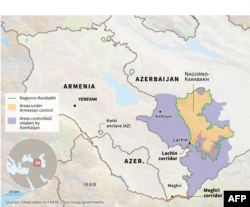Negotiators said Friday there were no results to report after the first day of talks between representatives for ethnic Armenians in Nagorno-Karabakh and Azerbaijan’s government to discuss the future of the breakaway region.
In a statement, the separatists said they were negotiating the withdrawal of their troops and, “and to ensure the return to their homes of the citizens displaced by military aggression." The statement, as reported by Agence France-Presse (AFP), said they agreed to meet again soon, but did not specify when.
The two sides did agree to allow humanitarian aid into the Nagorno-Karabakh region, where the estimated population of about 120,000 people are said to be suffering from shortages of food and other basic necessities. Convoys of trucks from both Armenia and Azerbaijan carrying humanitarian goods were seen entering the region Friday.
The Russia-mediated talks in Yevlakh, Azerbaijan, come a day after local fighters in Nagorno-Karabakh agreed to lay down their arms to end an offensive by Azerbaijan’s forces.
The U.N. Security Council held its own talks about the situation Thursday. Representatives from Armenia and Azerbaijan traded accusations during the meeting, with Armenian Foreign Affairs Minister Ararat Mirzoyan accusing Azerbaijan of launching an unproved attack and of “ethnic cleansing.”
Azerbaijan Foreign Affairs Minister Jeyhun Bayramov countered, calling the offensive “counterterror measures designed to disarm illegally armed forces in the region.”
Members of the council urged both sides to resolve their issues through diplomacy.
Meanwhile, protesters took to the streets in the Armenia capital, Yerevan, for the third day Friday. The protesters are calling on the government to protect Armenians in Nagorno-Karabakh and for Prime Minister Nikol Pashinyan to resign for his handling of the crisis. Police said several arrests were made.
Azerbaijan said it launched its operation Tuesday in response to landmine explosions that killed four soldiers and two civilians in the region. Azerbaijan President Ilham Aliyev used a televised address Wednesday to claim victory, saying Azerbaijan had restored the region’s sovereignty.
The Nagorno-Karabakh region is entirely within Azerbaijan but is populated largely by ethnic Armenians and had been under ethnic Armenian control since 1994, until parts of it were reclaimed by Azerbaijan during a war in 2020.
Along with Russia, the EU and the United States have an interest in the region and have held talks that are expected to continue, according to Mary Glantz, senior adviser on Russia and Europe Center at the United States Institute of Peace.
“The security of both sides and maintaining some sort of peace between those populations going forward is going to be a key issue [for] the international community — not just Russia and Turkey, but the EU and the United States,” Glantz told VOA’s Azerbaijan Service.
The security council will be convening to discuss the ongoing issues in the Nagorno-Karabakh region, which, Glantz hopes, will be able to reach some sort of plan to ensure peace going forward.
“The military conquering of Nagorno-Karabakh by Azerbaijan is just a piece of it,” she said. “Reintegrating the actual populations — having them live together side by side, the ethnic Azerbaijanis and the ethnic Armenians — is going to be an ongoing process.”
Some information for this story provided by The Associated Press, Agence France-Presse and Reuters.







